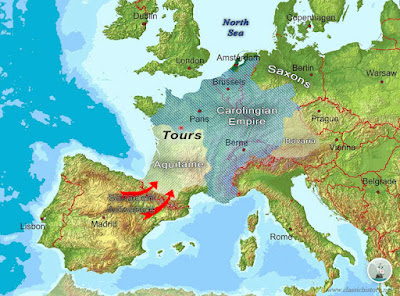Still, their approach to Tours galvanized Charles Martel to bring his army south to meet them after he got word from Odo the Great. He arranged his army south of Tours in defensive mode, rather than going on the offensive. He set up his army in phalanxes on hills with a wooded area in front of them, which would force the Muslims to break up among the trees. The trees also prevented the Muslims from seeing beforehand the size and arrangement of the Frankish forces. The hills also meant that the Umayyads would have to attack while running uphill.
Al-Rahman's army arrived to the area on 10 October, but he did not want to attack immediately. After seven days of waiting, the Umayyads attacked, leading with their cavalry. The cavalry charged several times at the Frankish phalanxes, breaking through them repeatedly. The phalanxes were well-trained infantry, hired and extensively trained by Martel over recent years thanks to financial support from Pope Gregory II. They were disciplined and did not scatter.
The Mozarabic Chronicle of 754 goes on to say:
The northern peoples remained as immobile as a wall, holding together like a glacier in the cold regions. In the blink of an eye, they annihilated the Arabs with the sword. ... But suddenly, within sight of the countless tents of the Arabs, the Franks despicably sheathed their swords postponing the fight until the next day since night had fallen during the battle. Rising from their own camp at dawn, the Europeans saw the tents and canopies of the Arabs all arranged just as they had appeared the day before. Not knowing that they were empty and thinking that inside them there were Saracen forces ready for battle, they sent officers to reconnoiter and discovered that all the Ishmaelite troops had left. They had indeed fled silently by night in tight formation, returning to their own country.
Call it luck or call it the result of clever strategy by Charles Martel, the Umayyad Caliphate retreated to the Iberian Peninsula, abandoning Europe to Europeans. Al-Rahman was killed in battle. Despite the defeat, he is praised for being an able commander, and we should take a closer look at him next time, as well as his son, who attempted another invasion of Gaul just a few years after Tours!

